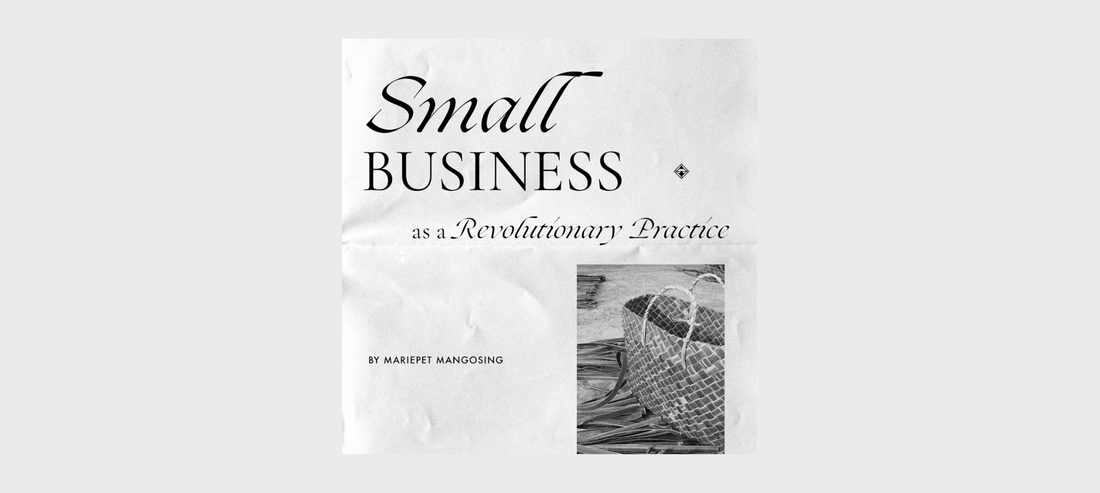By Mariepet Mangosing, Guest Writer for VINTA Gallery
Let’s set the scene. You’re hungover. Out of Pepto. No corner bodega. There’s a mom-and-pop pharmacy a little further down the street, right across from a Walgreens. Maybe, the inclination might be to go to Walgreens, right? It’s an established corporate business that offers the same over-the-counter meds as its neighbor and probably for a competitive, if not better price. While that might seem well and good, do you ever question: What is the difference? Is it nominal? What would it be like to go out of your way to the mom-and-pop shop instead?
It simply might not run that deep for you but when we step outside ourselves for a second, considering how things are made and how it got to you is a worthwhile thought to chase. If we have to participate in an often unfair capitalistic society, questioning if something we buy aligns with our values is the least we can do. After all, the first step of a revolution is recognizing that something has to change.
When I think about social justice today, I realize that so much of it hinges upon individual action as it affects collective consequence, yet some of our choices result in another’s death for one’s benefit. We are seeing a severe decline in our government’s ability to, well, govern. They make consistently terrible decisions and spew thinly veiled propaganda. The POTUS’ seedy, geo-political thirsty support of Israel can be seen as yet another breakdown of democracy in this country — as progressives scream and shout for a ceasefire, befallen on deaf ears.
Adrienne Maree Brown, author of Pleasure Activism, in discussion with Deem Journal notes Octavia Butler’s analysis on the collective quoting, “Our human fatal flaw is the combination of hierarchy and intelligence.” Brown continues, “For as long as we can look back, we see forms of human hierarchy. But not all power systems need to be fatal. I think that one reason for hierarchy is that it's actually much harder to facilitate direct democracy, direct communication, and relationship building. We default to hierarchy instead of deepening the kind of relationship work it would take to create other, less centralized structures.” To exist in today’s climate crumbling, political turning, and technological advancing world — this notion that our daily habits can decentralize flawed systems is not only revolutionary but also a necessity. Our government, largely run by corporations and privatized big business, relishes in an economy that doesn’t give a shit if you’re not rich. Considering this, it’s even more dire for us to find a different approach to force the guilty hand that fails us.
English philosopher and physician John Locke believed that every citizen has the right to life, liberty, and property and it is to be protected at all cost. While Locke ended up being more individualistic than someone like Karl Marx — that innate principle of protecting each other is common ground. We have an obligation to serve each other, however, the infrastructure capitalism is built upon isn’t made for that. Capitalism drives us to lean on convenience and instant gratification, which is not our exact right. As evidenced by our own US history, individualist mindsets are some kind of ruin.
So, we pivot. We start with really questioning things and taking a look at our everyday moves. You do end up going to the mom-and-pop shop and buy all of your antacid needs there. Maybe, you’ll establish a community with the local businesses and be a part of something way less commercial. Not to say that establishing a community cannot readily happen in a Walgreens but I could bet that climbing a corporate ladder is less important at Bob’s Pharmacy. Even with small business, perceived hierarchies can exist but Brown isn’t a purist in that way. She believes that while age and experience are sensical hierarchies — the desire to “screw over to get ahead” isn’t its main goal. Small biz yields a different impact.

To compare, Walgreens is the second biggest drugstore chain in America behind CVS. Walgreens CEO Stefano Pessina’s net worth is 6.9 billion, which is no accident. He likely benefits from paying minimum wage and receiving tax cuts. With these facts alone, which I got off the first page of a Google search, it doesn’t seem right. Trusting that feeling — the seeds of revolution are sown.
Of course, then, we come down to the point where we re-associate what the words “abolish,” “reform” and “revolutionary” imply. Contrary to conservative belief, these words are not swears. They are merely indicative of an era that has had enough. Clearly, the system we live in isn’t working. There is a flaw that keeps tricking the circuit but it’s become invisible, impossible to detect. Sometimes when things are so messed up, it’s best to start over. Abolish, reform, and revolution become goals — these carry the weight of wanting better and most urgently, the means.
Radicalized thoughts only turn into change when it seeks practice. True revolution happens at the intersection of theory and action. In a David vs. Goliath context, shopping small businesses can be seen as one of the ways to turn these thoughts into action. Change you can hold. Small biz aims to uphold community values for the generations to come.
If I were to use VINTA as an example — VINTA produces heirloom quality pieces that are ethically designed, sourced and made. We are slow fashion, our pieces are meant to hand down to generations, which addresses the ongoing environmental and waste crises. We are a people first business that makes sure that our team is paid a sustainable livable wage, a problem that plagues the fashion industry. While I don’t mean to sound like an advertisement (and frankly, it’s none of my business where you shop), I’m merely highlighting the consideration and care that goes into running a small business. The same care that connects us to our attention to radicalize, revolutionize, and show up for everyone — making sure we do, indeed, serve each other. Preferably, before it’s too late.
As we reflect on our consumer thoughts and patterns — from re-philosophizing our views on capitalism to shopping at bodegas and mom-and-pop type businesses — our response to this specific call to action is crucial. As seen with our global divestment in Starbucks and McDonalds in support of Palestine, we already know the effect our buying (or, not buying) decisions have. Perhaps, we wield that power and make something of it.
--- ---
Mariepet Mangosing is a screenwriter and author based in Los Angeles. She has a MFA in Screenwriting from Loyola Marymount University, has been shortlisted in the Blacklist x Macro Feature Incubator program, and published in several art publications. She writes from a perspective that reflects on her lived experience as a first-gen Filipina from New Jersey, examining the inner lives and seeking truths from children of the Diaspora.








